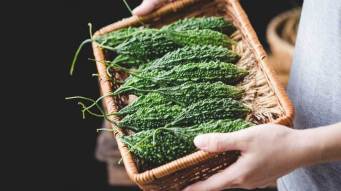If you’re looking to keep your digestive tract healthy, your hunger and blood sugar levels stable, and prevent cravings from causing you to go overboard with the mince pies and chocolate this Christmas, consuming more of the bitter taste could be your best bet.

Of the six tastes known throughout Eastern medicine (sweet, sour, salty, bitter, pungent and astringent, as well as the additional Japanese-originating Umami), bitter is the one we in the modern world seem to steer away from and know the least about. In fact, of all the senses, scientists know the least about taste than any other. Our love of salty and sweet snacks almost a global addiction, there’s little room for consuming things that are bitter and unindulgent. One of the reasons many of us may have a dislike for bitter foods, is that the bitter taste is sometimes a marker for toxicity. Plants and herbs that are inedible or poisonous generally taste bitter, and the taste buds that specifically detect bitterness have been long thought to be located at the back of the tongue as our ‘line of last defence’. The bitter taste buds however, are found in much larger and more dispersed areas of the tongue, indicating that humans have evolved with a much closer relationship and use of bitterness than we may do today. In edible foods however, the bitter taste can be incredibly beneficial for reducing craving and enhancing digestion.

Staying Balanced With Bitters
So what happens when we consume bitter foods? For one thing, the consumption of bitter foods moderates blood sugar and hunger levels, two things that can be very difficult to moderate over the festive season. Dr. Andrew Weil is an integrated practitioner of medicine with over 30 years experience, and has an extensive blog covering a wide array of natural health topics. He says; “Bitter foods also affect health in that they stimulate the liver to produce bile, which is an important part of optimal digestion. Bile emulsifies fats and renders nutrients – especially fat-soluble ones such as vitamins A, D, E and K – more available”. So by consuming bitter foods, we can prevent liver damage from those Christmas party drinks, and actually retain the benefits of the festive foods high in these vitamins like carrots, greens, meats, nuts and seeds, and butternut squash.

If you’re experiencing feelings of lethargy or heaviness, or feel the onset of indigestion and bloating, opt for bitter herbs as the tonic to reducing these issues. Ayurvedic wisdom says that indigestion and bloating, heaviness and lethargy are some of the symptoms of excessive Kapha and Pitta energy. The Kapha dosha holds the qualities of earth and water, steadiness, cohesion, stability, lethargy and heaviness, and Pitta digestive issues usually present as acid reflux or heartburn. If you’re feeling these qualities, opting for the light, sharp, cleansing qualities of bitterness, or Tiksa in Sanskrit, as it helps reduce water retention and clear a congested liver. Try some of the following bitter herbs and foods to help yourself stay well this festive season – its likely these foods will be on your table this season anyway!:

- Cruciferous vegetables like broccoli and brussels sprouts
- Citrus peel
- Turmeric
- Fenugreek
- Leafy greens
- Basil
- Nettle
- Bitter Melon
- Bitter tonics like Angostura Bitters before dinner
- Cranberries
- Unsweetened cocoa
- Coffee
- Green Tea
- Red wine



Leave a Reply